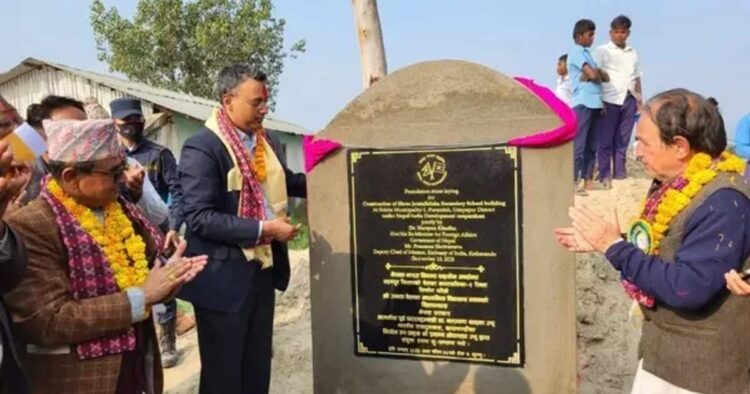In a collaborative effort between Bharat and Nepal, the foundation stone for the construction of Shree Diding Basic School was laid in Sankhuwasabha District. The ceremony was jointly conducted by Pasang Nurbu Sherpa, Chairman of Chichila Rural Municipality, and Avinash Kumar Singh, First Secretary at the Embassy of Bharat in Kathmandu.
The school, located in Chichila Rural Municipality-3, is receiving financial assistance from the Government of India totaling Nepalese Rupees (NRs) 40.29 million. This funding falls under the ‘Nepal-India Development Cooperation’ initiative, aiming to enhance educational infrastructure in Nepal.
The project encompasses the construction of double-storied academic and administrative blocks, along with other essential facilities for the school. It is designated as a High Impact Community Development Project (HICDP), executed through an agreement between the governments of India and Nepal, facilitated by Chichila Rural Municipality.
Chairman Sherpa expressed gratitude for Bharat’s continued developmental support, emphasizing its significance in advancing key sectors vital for Nepal’s progress. The new school building is poised to significantly improve educational opportunities for students in the region, fostering a conducive learning environment and contributing to overall educational development.
Since 2003, Bharat has undertaken over 550 HICDPs in Nepal across various sectors, with 488 projects already completed. Notably, 85 projects are located in Koshi Province, including two in Sankhuwasabha. Additionally, Bharat has generously gifted 974 ambulances and 234 school buses to healthcare and educational institutions in Nepal.
The collaboration between Bharat and Nepal extends beyond infrastructure development, encompassing wide-ranging cooperation across multiple sectors. Through initiatives like HICDPs, Bharat reaffirms its commitment to supporting Nepal’s developmental endeavors, particularly in critical areas like education.
The foundation stone-laying ceremony was attended by political representatives, government officials, social workers, school management representatives, teachers, parents, and students, underscoring the collective effort towards advancing education and community welfare in Nepal.

















Comments